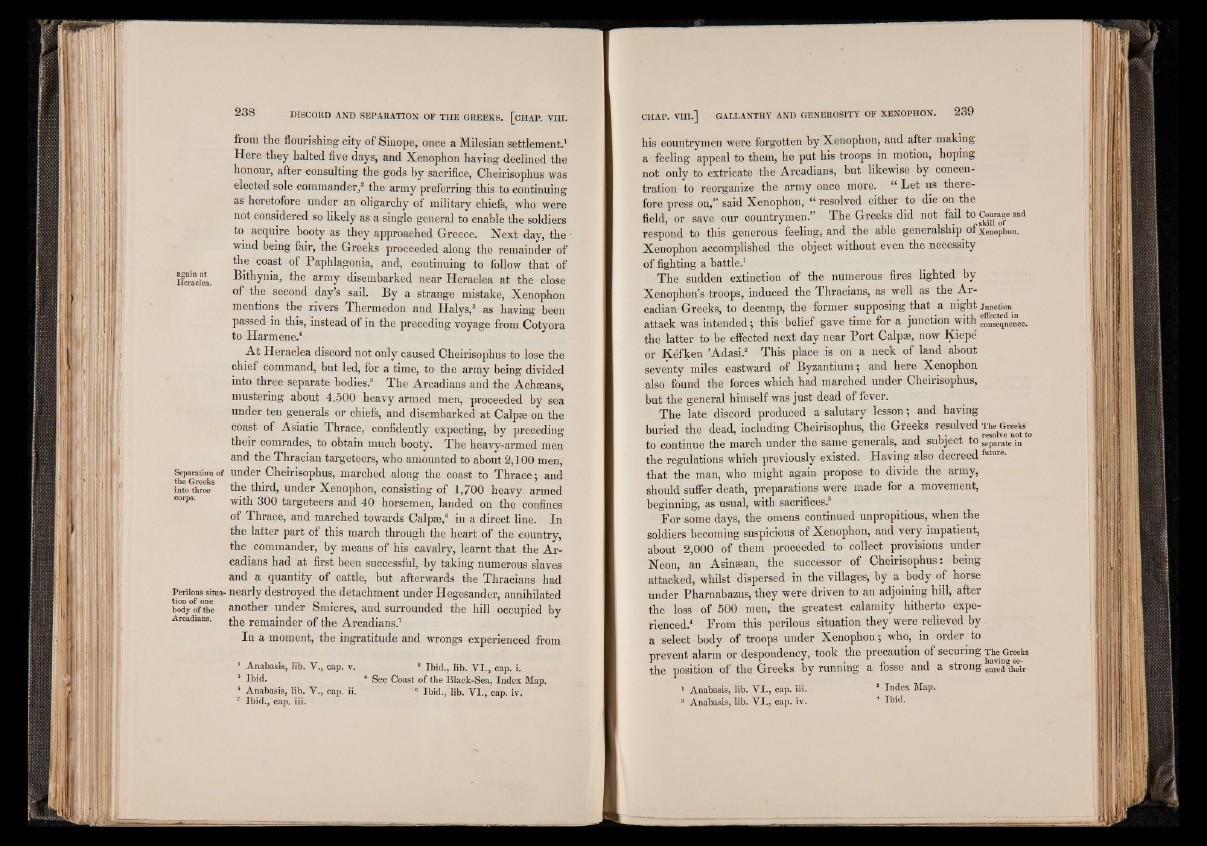
again at
Heraclea.
Separation of
the Greeks
into three
corps.
Perilous situation
of one
body of the
Arcadians.
from the flourishing city of Sinope, once a Milesian settlement.1
Here they halted five days, and Xenophon having declined the
honour, after consulting the gods by sacrifice, Cheirisophus was
elected sole commander,2 the army preferring this to continuing
as heretofore under an oligarchy of military chiefs, who were
not considered so likely as a single general to enable the soldiers
to acquire booty as they approached Greece. Next day, the
wind being fair, the Greeks proceeded along the remainder of
the coast of Paphlagonia, and, continuing to follow that of
Bithynia, the army disembarked near Heraclea at the close
of the second day’s sail. By a strange mistake, Xenophon
mentions the rivers Thermedon and Halys,3 as having been
passed in this, instead of in the preceding voyage from Cotyora
to Harmene.4
At Heraclea discord not only caused Cheirisophus to lose the
chief command, but led, for a time, to the army being divided
into three separate bodies.5 The Arcadians and the Achseans,
mustering about 4,500 heavy armed men, proceeded by sea
under ten generals or chiefs, and disembarked at Calpae on the
coast of Asiatic Thrace, confidently expecting, by preceding
their comrades, to obtain much booty. The heavy-armed men
and the Thracian targeteers, who amounted to about 2,100 men,
under Cheirisophus, marched along the coast to Thrace; and
the third, under Xenophon, consisting of 1,700 heavy armed
with 300 targeteers and 40 horsemen, landed on the confines
of Thrace, and marched towards Calpai,6 in a direct line. In
the latter part of this march through the heart of the country,
the commander, by means of his cavalry, learnt that the Arcadians
had at first been successful, by taking numerous slaves
and a quantity of cattle, but afterwards the Thracians had
nearly destroyed the detachment under Hegesander, annihilated
another under Smicres, and surrounded the hill occupied by
the remainder of the Arcadians.7
In a moment, the ingratitude and wrongs experienced from
1 Anabasis, lib. V., cap. v. 3 Ibid., lib. V I., cap. i.
3 Ibid- 4 See Coast of the Black-Sea, Index Map.
5 Anabasis, lib. V., cap. ii. 0 Ibid., lib. V I., cap. iv.
7 Ibid., cap. iii.
his countrymen were forgotten by Xenophon, and after making
a feeling appeal to them, he put his troops in motion, hoping
not only to extricate the Arcadians, but likewise by concentration
to reorganize the army once more. “ Let us therefore
press on,” said Xenophon, “ resolved either to die on the
field, or save our countrymen.” The Greeks did not fail to Courage and
respond to this generous feeling, and the able generalship of Xenophon.
Xenophon accomplished the object without even the necessity
of fighting a battle.1
The sudden extinction of the numerous fires lighted by
Xenophon’s troops, induced the Thracians, as well as the Arcadian
Greeks, to decamp, the former supposing that a night junctkm^
attack was intended; this belief gave time for a junction with consequence.
the latter to be effected next day near Port Calpae, now Kiepe
or Kefken ’Adasi.2 This place is on a neck of land about
seventy miles eastward of Byzantium; and here Xenophon
also found the forces which had marched under Cheirisophus,
but the general himself was just dead of fever.
The late discord produced a salutary lesson; and having
buried the dead, including Cheirisophus, the Greeks resolved TteGreeks^
to continue the march under the same generals, and subject to separate in
the regulations which previously existed. Having also decreed
that the man, who might again propose to divide the army,
should suffer death, preparations were made for a movement,
beginning, as usual, with sacrifices.3
For some days, the omens continued unpropitious, when the
soldiers becoming suspicious of Xenophon, and very impatient,
about 2,000 of them proceeded to collect provisions under
Neon, an Asinsean, the successor of Cheirisophus: heing
attacked, whilst dispersed in the villages, by a body of horse
under Pharnabazus, they were driven to an adjoining hill, after
the loss of 500 men, the greatest calamity hitherto experienced.
4 From this perilous situation they were relieved by
a select body of troops under Xenophon; who, in order to
nrevent alarm or despondency, took the precaution of securing Tie Greeks
r * . n i , having se- the position of the Greeks by running a losse and a strong cured their
1 Anabasis, lib. V I., cap. iii. 2 Index Map.
3 Anabasis, lib. V I., cap. iv. 4 Ibid.